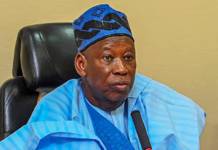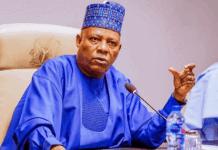The Federal Government has said that the rising poverty in Nigeria is as a result of the state governors who prefer building Flyovers, bridges and airports rather than developing rural areas through investment in agriculture.
Minister of State for Budget and National Planning, Clement Agba, while briefing the State House Correspondents after the week’s FEC meeting presided over by Buhari at the Presidential Villa, Abuja on Wednesday said the State Governments have failed to contribute their quota of development responsibilities to the grassroots where the major production activities take place.
Agba was responding to a question demanding to know what he and his colleague, the Minister of Finance, Budget and National Planning, Zainab Ahmed, were doing to ameliorate the biting hardship facing the majority of Nigerians at the moment.
The Minister explained that the Federal Government, through many of its social security programmes, has been dedicating resources to alleviating hardship on the public, but noted that state governments, which have been consistently receiving their shares of national resources, had been misdirecting the resources to projects that have almost no direct effect on the needs of the people.
He pointed out that 72 percent of the poverty in Nigeria is found in the rural areas, which he said had been abandoned by governors, adding that the state executives prefer to function in the state capitals.
Agba pointed out that while states are in charge of land for agriculture, they do not invest in them for the desired effect on their rural citizens.
He advised Governors that rather than concentrate attention on the building of sky scrappers, flyovers and bridges, they should focus on initiatives that can pull the majority of the people out of poverty.
He said, “In the first place. I just returned this morning from a Brussels where 106 countries nowadays are 27 countries from Europe and 79 countries from the Organization of African Caribbean and Pacific countries. What was the deliberation on? Basically on how should the world-over tends to do around food and energy and energy crisis.
“I think that it’s always good for us to put things in the right perspective. Like I say to people, when you say government, we should be able to specify which government we are talking about. Is it a federal government? Is it a state government or is it a local government? Because we all have different responsibilities. And it is for this reason that we last year started some work on the multi dimensional poverty index, for which we recently released the report and it was lunch by Mr. President.
“To say in the past, we’ve always looked at monetary poverty. But poverty like we know has different pieces, different intensity and different causes. And it is for this reason, I went around the 109 senatorial districts in Nigeria, to carry out those survey and to be able to say specifically, where this hardship is.
The result clearly show that 72% of poverty is in the rural areas. It also showed clearly, that Sokoto state is leadingin poverty with 91%. But the surprising thing is Bayelsa being the second in terms of poverty rating in the country. So you see the issue is not about availability of money. But it has to do with the application of money. In the course of working on the national development plan, we looked at previous plans and say why they didn’t do as much as was expected. We also looked at the issues of the National Social Investment Programme.
“At the federal level, government is putting out so much money but not seeing so much reflection, in terms of money that has been put in alleviating poverty, which is one of the reasons the government also put in place the national poverty reduction with growth strategy. But if the federal government puts the entire income that it earns into all of this without some form of complementarity from the State governments in playing their part. It will seem as if we are throwing money in the pond. Because the governors basically are only functioning in their state capitals. And democracy that we preach about is delivering the greatest goods to the greatest number of people. And from our demographic, it shows that the greatest number of our people who live in rural areas, but the governors are not working in the rural areas.
“Right now 70% of our people live in rural areas they produce 90% of what we eat. And unfortunately 60% of what they produce is lost due to post harvest loss and it does not get to the market.
When we’re talking about food prices, like I mentioned right now as driving inflation, prices of food at the farm gates are low. But when you now take it to the urban areas, you find out that the prices are high due to supply chain disruptions, lack of infrastructure to take them there.
I think from the federal government side we are doing our best. But we need to push that rather than governors continuing to compete to take loans to build airports that are not necessarily where they have other airports so close to them. Or governors now competing to build flyovers all over the place and we applaud they should concentrate on building rural roads so that the farmer can at least get their products to the market. And you find that if they do that and with the new policy in the national development plan that talks about taking power to the rural areas, especially of out-grid power that can easily be put, you begin to attract industries to those areas for value addition.
“UNIDO report shows us in terms of employment, the MSMEs employs 70% of our people. So you can imagine how much progress we will make when you find that there are roads, there is power in these rural areas.
In terms of agriculture, you find out that the federal government doesn’t have a land that they would plant, government has pushed for the Anchor Borrowers programme and that is going on very well but the state control lands states. They are the ones to provide land for agriculture. They are not investing in that. They would rather build skyscrapers in a city where people will see and clap but the skyscrapers does not put food on the table.
“Like i always say, if you look at the Abraham Maslow’s hierarchy of needs. He says you have to take care of the basic needs of individuals first before you begin to talk about self actualization. So we need to take care of the issues of food, nutrition, housing and clothing for our people. Before we begin to think of how to go to the moon and begin to build flyovers and airports in the state capital, that is the missing link which we need to push so that we’ll be able to catalyze growth. But continuing to say federal government or my sister, Zainab and I what are we doing? We are doing our parts. And I’m sure Wike told you guys about monies that have been released over N500 billion to the oil producing states and I’ve seen some disclaimers from the states saying, it is small small money they are getting on a monthly basis. And some are giving some half truths of what they have received. We need to hold them accountable. So that together we all can grow our economy.”

























